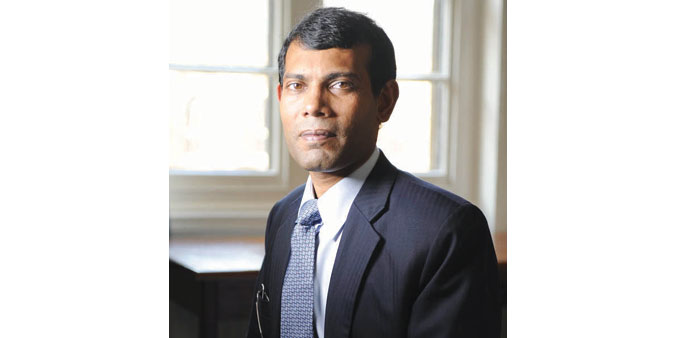AFP
Colombo
The Maldives said yesterday it would appeal against the controversial conviction of former president Mohamed Nasheed for terrorism as it emerged his 13-year jail sentence had been commuted to house arrest.
The United Nations had described Nasheed’s jailing in March after a quick-fire trial as “vastly unfair” while Washington had warned the conviction meant the honeymoon islands’ fledgling democracy was in
danger.
But in a surprise announcement contained in a government statement, authorities sought to distance themselves from the conviction before later confirming Nasheed was no longer
behind bars.
“The prosecutor-general of the Maldives has decided to appeal the case of former president Mohamed Nasheed,” said the statement.
The decision to appeal had been based on Nasheed’s complaint of “procedural irregularities” in his trial, the statement added, including “the violation of some fundamental rights and inadequate time to prepare his defence”.
Supporters of Nasheed, the archipelago’s first democratically-elected leader before being toppled in 2012, have maintained the conviction was part of a strategy by President Abdulla Yameen’s regime to silence him.
The sentencing on March 13 came less than a month after his arrest on February 22.
The government’s own legal officers had pushed for the maximum sentence to be imposed on Nasheed and had stoutly defended its legal system in the face of an international backlash.
Nasheed had been incarcerated in a prison on a remote island after the sentencing in March although he was later moved to the main island of Male for medical treatment.
News that Nasheed would not now have to go back to prison came at a press conference in neighbouring Sri Lanka from one of his lawyers.
US-based attorney Jared Genser said the government’s decision to appeal the conviction was “bizarre” and it was difficult to comprehend how the sentence of a “convicted terrorist” could be commuted to house arrest.
“This is not just a U-turn by the government, it is bizarre,” Genser told reporters in Colombo.
“There is no rule of law in the Maldives and they make it up as they go along.”
A spokesman for the Maldivian High Commission in Colombo confirmed the changes to Nasheed’s sentence, but gave no further details.
“It is correct that the jail term is now commuted to house arrest,” Hussain Mazin said.
Genser said his client’s sentence had been formally commuted
to house arrest on July 19.
“At the request of the government, he (Nasheed) did not make this commutation public until now,” said Genser, part of a team of international lawyers for Nasheed which includes Amal Clooney.
Yameen has faced a chorus of international criticism over the jailing of Nasheed, whom he beat in a run-off presidential election in late 2013.
Nasheed’s lawyers resigned before the end of his trial, saying it was aimed at destroying his career.
It came at a time of growing opposition to Yameen’s government and was expected to prevent Nasheed from running for president in 2018.
US Secretary of State John Kerry warned in May that democracy in the Maldives was under threat, saying Nasheed had been “imprisoned without due process”.
Nasheed, a climate change activist who was also imprisoned during the three-decade rule of former strongman Maumoon Abdul Gayoom, was elected president in 2008.
He then rose to international prominence by hosting a cabinet meeting underwater to draw attention to the dangers facing the islands’ existence from global warming.
But he was toppled in February 2012 after a mutiny by police and troops that followed weeks of protests over the arrest of a top judge.
Nasheed had ordered the arrest, and it formed the
centre-piece of his prosecution.
The islands’ placid seas may be a draw for tourists but the political scene has been riven by turmoil in recent times.
Yameen, who is Gayoom’s half-brother, recently sacked his deputy Mohamed Jameel on a charge of treason and jailed two former defence ministers this year on charges of trying to topple the government.
Despite the criticism from the US, the Maldives’ ties with China have been strengthening and Beijing has been silent on the Nasheed controversy.
Yameen on Thursday approved a law allowing foreign ownership of land for the first time, triggering concern that it could open up a possible landgrab by China in the backyard of its rival India.

Mohamed Nasheed... under house arrest
